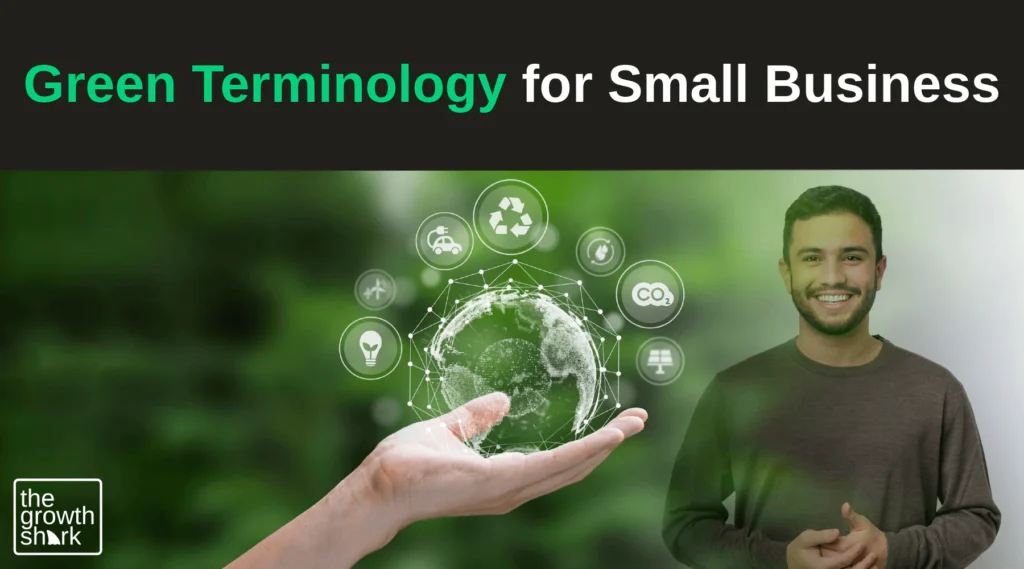What does it mean when a business claims the title “Green Business”?
While you may be familiar with green terminology for small business, let’s break down what businesses really mean.
Eco-friendly terminology for small business can include eco-sustainability, fair trade, and other ethical business practices.
When a business labels itself with these terms, it sets an example for other businesses in the industry.
These eco-friendly words are more than just words.
They paint a picture of how the business operates, with a global responsibility to benefit rather than harm the environment.
What does eco-friendly mean? What is eco? Let’s learn more about sustainable terminology and its meanings.
If a business uses green terminology, does it always mean they live their word?
We will cover greenwashing and how to recognize a business that poses under the facade of going green.
What Is a Green Business?

A green business practices sustainability in all of its dealings.
Whether the business is in the food, cosmetic, or coffee industry, the company implements sustainable and eco-friendly systems.
For example, Joyride Coffee is a fair-trade coffee company. They support coffee farmers and ensure they are being paid fairly.
They also use green terms to describe their love of the rainforest and how they want to support eco-conscious products rather than sourcing the cheapest coffee beans regardless of the environment.
Green terminology for small business isused by businesses that use recyclable containers to sell their products.
This can happen in food, cosmetics, and clothing companies.
Find businesses that choose green practices without focusing on the bottom line.
In your business, you may have to pay more by implementing ethical manufacturing and production practices.
But you will save in other ways by choosing to use recycled materials or having an edge over competitors with your sustainable values.
Eco-friendly terminology for small business can be used by anyone.
Learn about the eco-friendly meaning and other green terms to determine the legitimacy behind these claims.
The Definition of a Green/Sustainable Business
What makes something sustainable, whether a company uses eco-friendly marketing terms or not?
“The green business definition describes a company that does not make any negative impact on the environment, economy, or community.
These types of businesses are forward-thinking when it comes to human rights, environmental concerns, and related issues.
Green businesses use environmentally sustainable resources and uphold socially responsible policies.” – UpCounsel.
If a company uses green terminology for small business, are its actions matching its claims?
Watch a business closely to recognize if its actions match its marketing language.
You can find trustworthy companies that follow their word. You just have to know what to look for.
Types of Green Businesses and What They Do
Several types of businesses use eco-friendly terminology for small business.
No matter what industry, you can implement enviro-friendly practices.
Here are some ideas for creating a sustainable business.
Repair and Refurbishment
Unfortunately, people get used to throwing things out when they no longer work.
How many refrigerators and other large appliances are tossed away in a landfill?
Companies that focus on the repair and refurbishment of appliances, furniture, bicycles, and electronics can use green vocabulary words for marketing their business.
They are living and breathing one of the Rs of sustainability: reuse.
Choose repaired and refurbished items to support these businesses in their mission
Floral Business
Choose green terminology for small business to promote a floral business.
Plants and flowers are essential to healthy and beautiful living spaces.
What makes something sustainable? A business that grows and nourishes the earth is eco-conscious when they do it right.
Recycle soil, use an irrigation system that does not waste water, and maximize the renewable energy from the sun.
Secondhand Sales
Thrift stores are sustainable companies.
Eco, what does it mean? Reusing items that one person no longer needs is eco-friendly.
This means that instead of discarding the items as trash, they are sold to be reused by those who may consider them treasures.
Reduce trash by selling items secondhand.
Use green terminology for small business to label your company and inspire others.
Products Made from Recycled Plastic
An innovative way to build a green business is by repurposing items made from recycled materials.
For example, shoes, furniture, rugs, and swimwear made from recycled water bottles are on the market today.
Take a big problem, like the ocean filling up with plastic, and find a way to use the plastic for better.
Practice eco-sustainability while turning a profit and helping the environment.
Digital Marketing
The Growth Shark team constantly practices sustainability in our daily practices.
We partner with companies that are cause-driven and take special care of the environment and use their power for good by bringing awareness to social issues that need attention.
Let us help you think of a passion and implement it into your sustainable and eco-friendly business plan.
As you can see, any type of company can use eco-friendly marketing terms and actually have the habits to back up what it says.
Use green terms for small business to promote your business.
Then watch as consumers with a shared purpose flock to support you.
What Are the Best Practices for Sustainable Brands?
What matters more than anything is the daily efforts a business makes to reduce its carbon footprint.
Recycle, reduce water use, promote reusable water bottles and food containers, educate employees on what makes something sustainable, and use green vocabulary words.
Stand behind your green terminology for small business and let enviro-friendly efforts lead your business decisions.
Green Business Certification
Many companies can spout off an eco-friendly wordlist to represent their products and services.
But consumers are slow to trust a company until it has proven itself. That’s when green business certification comes in.
National Funding advises, “If you have a track record of eco-friendly practices, consider making it official with a green business certification.
With all the other tasks you’re juggling as a business owner, you may be hesitant to add another time- and resource-consuming item to the mix. But once you’ve assessed the potential advantages of getting certified, you may decide it’s well worth the effort.” Show off your eco-friendly practices and earn your green business certification to prove your business trustworthy.
Benefits of Eco-Friendly Practice

While there are environmental benefits to using green terminology for small business, there are also benefits for your business.
Set your company apart by following your passion and weaving it into your business strategy.
Consumers who share your values will immediately connect with your mission.
Once you build a brand community, your customers are more likely to support you throughout your business endeavors.
Social Responsibility
Have you heard of a business that is going green? What is the go green meaning?
When a company announces they are going green or already uses eco-friendly terminology for small business, they feel a social responsibility. By running a business, they do not want to impact the environment negatively. So they take an oath to reduce the number of resources they use.
When a business vows to recycle, use less printed marketing materials, and reuse supplies, it will reduce its carbon footprint.
Competitive Advantage
When you commit your business to sustainability, you will gain an edge over competitors that may be more careless on that topic.
For example, if a consumer has a chance to support a shoe company that makes their shoes from recycled water bottles, the consumer feels eager to support sustainability while buying cute and comfortable shoes.
They will even pay more for a shoe from a sustainable company because they are donating to a good cause by supporting the green business model.
How can you demonstrate sustainability in your business?
Use eco-friendly phrases to communicate your mission to reduce your carbon footprint.
And more importantly, walk the talk.
Put action behind your eco-friendly terminology for small business. Consumers want to see how you define what does eco-friendly mean, so show them.
Post videos to your social accounts that demonstrate your service to the community.
Show how you communicate sustainability to your employees.
And create products that make it easier for the consumer to implement green practices at home.
Cost Savings
By practicing sustainability, you can see cost savings for your business.
For example, if you implement a culture of reducing the use of electricity in the office, you will see huge savings in your electrical bill.
If your employees were carelessly leaving lights on and running the air conditioning when no one was in the office, those costs can add up.
Once you implement a culture of sustainability, you will see more courtesy in the use of electricity, recycling, and reusing office materials.
As a result, you can enjoy financial rewards.
Attracting and Retaining Talent
When your employees work together for a common purpose, it builds a sense of community within the organization.
Top talent will be happy to work for an office that has a bigger purpose in mind.
Instead of just showing up to work each day, they are also contributing to and helping the environment.
These practices promote more longevity in your employees, keeping your retention rates high and eliminating the need to train and retrain new employees.
Green Terms and Buzzwords and What They Mean

As many companies inundate you with a sustainability vocabulary list, you may not understand everything they present.
Eco – what does it mean? What is environmentally friendly definition? It’s hard to keep all these words with eco straight.
Let’s talk about sustainability terminology and its meanings to better understand green businesses.
The 6 Rs
Many people are familiar with the 3 Rs: reduce, reuse, recycle. But have you heard of the 6 Rs?
Dive deep into the 6 Rs of sustainability to brush up on your eco-friendly terminology for small business.
We work with companies that practice the 6 Rs and incorporate their passions into their business models.
Think of ways your company would change if you were to implement the 6 Rs.
1. Rethink
“To understand what rethink means in the six Rs, think about this question: “do I really need that?”
This question is beautifully summarizing the concept behind the “rethink” principle.
This is what you should be asking yourself to start having a more sustainable lifestyle.
“Rethink” means that we should all be more mindful of our consumption habits to limit our impact on the environment.
This principle is an invitation to rethink our daily choices, realizing that the natural resources of the planet are limited and need to be preserved also for our children.
Rethink is the first of the 6 Rs of sustainability and the one people should look at with the highest priority.
Rethinking is so important because it is the first mental step that could help us change the world and save the environment.” – Sustainability Success.
Rethink the way you do business. Are there ways you can be better by putting the environment first?
2. Refuse
Refuse in terms of eco-friendly words means not receiving any items that are unnecessary.
If you never bring items into your home that are luxurious and unneeded, you won’t contribute to the landfill when you inevitably choose to throw them out.
Even if you are offered an item for free, refuse to take it so that you can continue on your path toward sustainability.
Refuse to buy products with excess packaging.
Refuse to support companies that are not environmentally responsible.
How can you implement the practice to refuse in your business practices?
When companies give you free items as a networking strategy, ask them to make a donation or implement a sustainability mission instead.
3. Reduce
Reduce in the sustainability vocabulary list is an important part of the environmentally-friendly definition.
Reduce your wardrobe, reduce your consumption of water, reduce how much gas you use, and reduce the use of lights in your home.
In everything you do, ask yourself if you can take better measures to contribute to the environment.
How can you apply this to your business? Reduce your office supplies.
Reduce your travel. Reduce your office space.
Technology provides so many ways that we can reduce our consumption in the business world.
4. Reuse
While some items need to be purchased new, there are so many items that can be used by multiple people and families.
For example, clothing can pass down from generation to generation.
Vintage clothing is even sought after and beloved.
Use reusable water bottles, reusable containers for your food, reusable straws, and other resources that do not need to be thrown away after one use.
In your business, reuse recycled materials to create product packaging.
And show consumers how to recycle your packaging when they are done.
Find unique ways to further your sustainability promise as you conduct business.
5. Repair
When a microwave stops working, do you throw it in the trash? What about a computer?
The eco-friendly meaning of repair is to fix items instead of throwing them out.
Parts in a microwave and computer can be refurbished into a working machine.
If you are not savvy with repairs, find appliance businesses that specialize in refurbishment.
You can even sell broken items online to find talented people ready to repair them.
Green terminology for small business should include repair and reuse.
In your business, use repair to keep appliances, vehicles, and electronics up and running as long as possible.
In addition, choose maintenance practices to reduce the need for repair.
6. Recycle
If you use eco-friendly terminology for small business, your company better walk the talk.
Recycle paper, cardboard, and cans. Educate employees about proper recycling processes.
When eco-friendly terminology for small business comes up, always think of recycling. How can you do better?
Other Important Terms
Be sure to take note of other eco-friendly phrases to make sure you are up to speed with businesses that are green-certified.
When consumers understand what you are marketing, they are more likely to engage and connect with your passion.
Compost
A mixture of discarded organic matter that is reused as fertilizer for the land.
Vitamins from compost enrich the land and promote growth.
A sustainable restaurant may create compost in their discarded vegetable and fruit scraps.
You can use your practice of composting in your marketing materials.
Show customers how important it is to reduce trash and use every scrap for good.
Biodegradable
Biodegradable items will reduce down to their primary elements and blend in with the soil.
They will break down naturally into more simple compounds over time.
Educate consumers on which items are biodegradable and which are not to reduce littering and pollution.
Carbon Footprint
Carbon footprint represents how much energy you use in a lifetime.
If you never recycle, are frivolous with electricity, and overindulge in luxuries, your carbon footprint will be larger and negatively impact the environment.
What are some ideas for reducing your carbon footprint?
Communicate the ideas in your eco-friendly terminology for small business.
Renewable Resource
A renewable resource is a source of energy that will never run out, like the sun or wind.
A nonrenewable resource has a limited supply, like water or fuel.
Does your business use solar panels to reduce the burning of fossil fuels and convert energy from the sun into electricity?
Tell your consumers about your efforts so that they will be inspired to do the same.
Fair Trade
Fairtrade is an ethical business practice that does not take advantage of the poverty in other countries.
Instead of cutting deals with marginalized farmers that do not provide living wages, fair trade promotes sustainable development and the rights of the workers.
Biocompatible
Biocompatible is different than biodegradable.
An item that is biocompatible breaks down naturally but does not disappear completely.
Still, it is beneficial to the earth in its most elemental form.
Do you intentionally use biocompatible materials in your business?
Tell your consumers about it by using an eco-friendly word list.
Where To Find A Glossary of Terms
Find a list of more green terminology at Green Nature Marketing.
Once you learn eco-friendly terminology for small business, you can use the language in your digital marketing efforts.
Schedule a call with us to get started on your business marketing strategy that implements green terminology.
Avoid Greenwashing

Beware of greenwashing.
We discussed earlier the tendency for some companies to claim they are green companies when they do not have the facts and practices to back it up.
Unfortunately, this is common across all industries.
What Is Greenwashing?
Companies use false eco-friendly phrases to give the impression that they are environmentally conscious when they are not.
They will package items in green packaging or even claim that something is biodegradable or made with natural ingredients.
Ecowatch details, “Greenwashing” is a common marketing ploy designed to make products seem more sustainable than they are.
It’s essentially a way to convince customers that a company is making positive environmental choices, often through eco-conscious verbiage designed to convince shoppers that the product is more natural, wholesome, or free of toxins than competitors.”
Other times, companies will highlight something they do that is environmentally friendly while failing to mention other practices that damage the earth.
How to Avoid Greenwashing
If you want to build long-term trust with your consumers, you have a responsibility to use integrity with every label you put on your product or service.
If you advertise that you are a sustainable company, you better practice the 6 Rs, even when no one is watching.
Use green terminology for small business with confidence and integrity to build a brand community of which you can be proud.
Prove Your Validity
Get green-certified to prove that your company practices sustainability in all practices.
In addition, you can get USDA-certified organic or Carbon Trust Standard labels for your food product or use other certifications to show that what you say is true.
Help Others to Recognize Invalid Claims
Look for empty phrases that cannot be validated.
Watch for companies that make a show of their noble services while damaging the environment behind the scenes.
If they compare to another product, make sure they provide the facts to back up their green company claims.
How Can Your Brand Better Incorporate Green Terminology?
Build brand loyalty when you share a passion with your consumers.
Customers will connect with your vision as you demonstrate your beliefs in eco-conscious practices.
Then you can engage and connect with your customers through social media and other marketing outlets over this topic.
Build a digital marketing strategy that brings purpose and meaning to your company.
Reach out to our team at The Growth Shark to see how we can help.
Incorporate green terminology and practices as you build your brand. To read more about how we can help you build a brand, read our blog, Building a Brand in 3 words.









